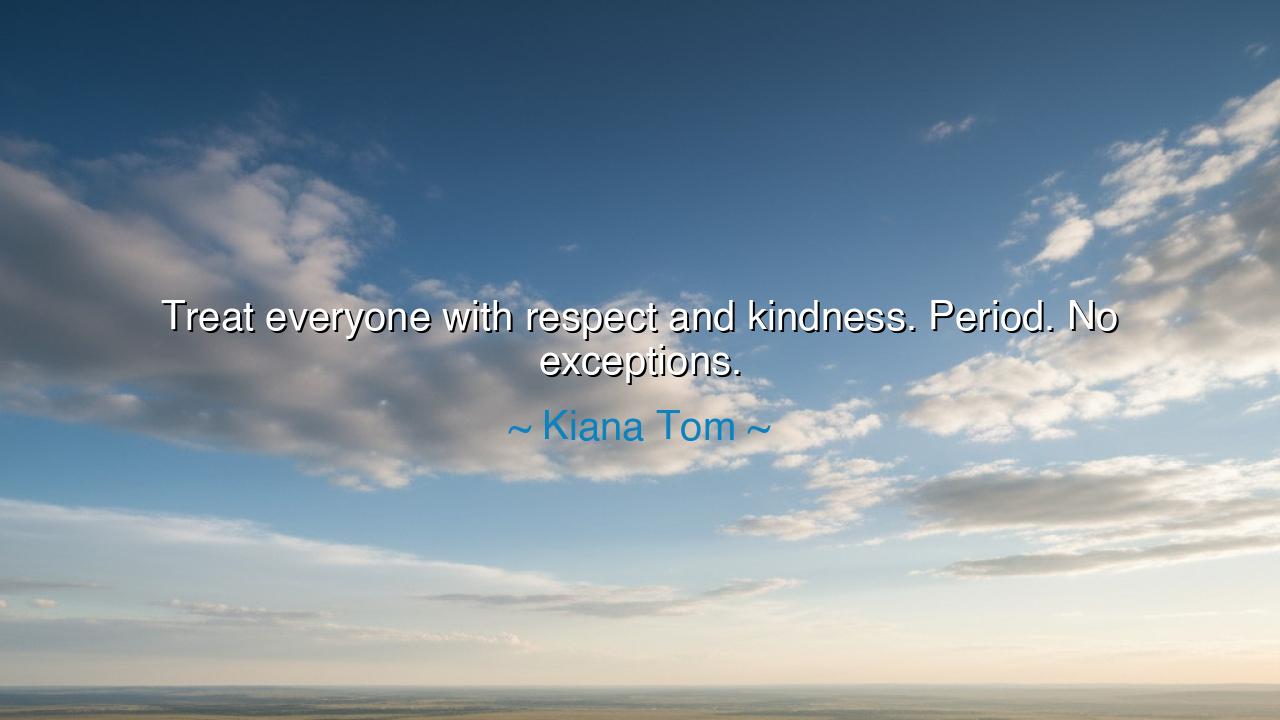
Treat everyone with respect and kindness. Period. No exceptions.






The words of Kiana Tom—“Treat everyone with respect and kindness. Period. No exceptions.”—resound with the clarity of a bell struck at dawn. They are simple, yet in their simplicity lies their power. For in these words is no room for hesitation, no allowance for excuses, no weaving of exceptions. They declare a law as ancient as the soul itself: that every person, whether clothed in wealth or in rags, whether mighty or forgotten, is worthy of respect and kindness. To deny this is to deny our shared humanity; to embrace it is to walk in the fullness of wisdom.
The ancients knew this truth well. The philosopher Seneca wrote that we must treat even our servants as companions of the same human fate, for though fortune may place us in higher rank today, tomorrow we may be in chains ourselves. To treat everyone with respect is to recognize that the same breath of life flows through us all. Kiana Tom’s words echo this timeless teaching, cutting through the distractions of modern pride and rivalry, reminding us that kindness is not a matter of convenience, but a duty without exception.
History gives us shining examples of this principle in action. Consider the life of Abraham Lincoln. In the midst of war and division, when bitterness could have consumed his spirit, he chose to speak of “malice toward none” and “charity for all.” Even to those who opposed him, he extended words of dignity. His kindness did not make him weak; it made him strong, for it revealed that his vision of unity was not rooted in vengeance, but in respect for the humanity of every soul. His greatness was not only in his leadership, but in his ability to honor even those who stood against him.
The power of Tom’s words lies in their insistence on “no exceptions.” Too often, people reserve kindness for those they deem worthy and withhold it from those they despise. But the true test of character is not how we treat our friends, but how we treat our enemies, our rivals, the stranger, the outcast, the powerless. To honor all without exception is to live not according to the shifting winds of emotion, but according to the eternal law of compassion.
There is also a heroic defiance in this teaching. The world will tell you: be kind when it benefits you; respect others if they respect you first. But Tom’s words command something greater: unconditional respect. This is not naivety—it is strength. For when we choose kindness without condition, we remove from others the power to corrupt our spirit. We stand as sovereigns over our own character, unmoved by hatred, unshaken by insult.
What lesson, then, can we take? That to live with respect and kindness toward all is to walk the highest path of humanity. Practically, this means greeting strangers warmly, listening without contempt even when we disagree, and showing compassion to those in need without asking whether they deserve it. It means restraining harsh words, offering patience in conflict, and remembering that every face we meet bears the image of the same humanity as our own.
Thus, Kiana Tom’s words are more than advice—they are a commandment for the heart: be kind, always, to all. Let no bitterness, no pride, no division strip you of this duty. For in the end, wealth fades, power crumbles, and glory is forgotten, but the memory of kindness endures forever. And those who live by this law leave behind a legacy more radiant than gold: the memory of a soul who treated every person with dignity, without exception.






AAdministratorAdministrator
Welcome, honored guests. Please leave a comment, we will respond soon